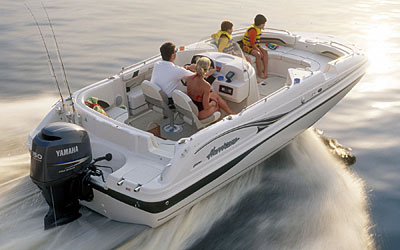
Summer is on its way and Americans will take to the water for fun and relaxation. Life is better in a boat, especially one that's powered by a modern fuel-friendly outboard. Yamaha Outboards' F150 four-stroke has become the model of choice with its efficient use of fuel and turn-key reliability. New boats and motors help make boating the stress-buster families need when they want to get away.
With the recent run-up of fuel prices, sticker shock has now been extended to the fuel pump. But for the boater who knows his or her time afloat is a needed stress buster, finding ways to trim boating costs makes good sense.
You can help your fuel take you farther and give you more time on the water by following these suggestions from Yamaha Marine, whose outboards are known for their fuel efficiency and turnkey reliability.
Make sure the hull is clean. If a boat has been sitting in the water for a long time, cleaning the hull is very important for reducing fuel consumption. A clean hull will not only move through the water easier, but handles better.
Don't under-power your boat. All boats are rated for maximum horsepower, but it's important to make sure you have enough motor to handle the load. Underpowered boats struggle to get up on plane and require higher throttle settings to move the boat, gear and people across the water. The result is poor fuel economy and an overworked engine.
Check your propeller. If your boat is slow to get out of the hole or lacks top end speed, your outboard might have the wrong propeller or it could be damaged. Prop diameter and pitch (the angle on the prop blades) can make a big difference in fuel economy and speed. Your local dealer can help you determine if your outboard has the right prop.
Keep the engine properly tuned. A well-tuned engine burns less gas. After a season-opener check-up of your engine, maintain your engine at regular intervals throughout the season. Proper maintenance extends the life of the engine, as well as saving fuel.
Use the proper grade of gasoline. Use the octane specified by the engine manufacturer. A high-performance outboard is similar to a high-performance sports car -- to run properly, it needs the right fuel. A lower-grade gas may foul the plugs and decrease performance, burning more fuel.
Yamaha, well known for its fuel-stingy outboards, holds the Guinness world record for greatest distance covered by an outboard powered boat on a gallon of fuel -- 67.27 miles per gallon by a trimaran-style skiff powered by a Yamaha F4 engine. But most U.S. boaters prefer larger boats and engines. Dealers say customers are pre-sold on the fuel-efficient direct injection and four-stroke outboards, two technologies for which Yamaha has earned industry and media awards.
Bill Waas in Florida says his customers are split 50-50 between Yamaha's HPDI, or High Pressure Direct Injection and four-stroke outboards. Yamaha built the world's first V6 four-stroke outboard with its F225 and now tops it line with an F250. Waas said, "Both offer great fuel economy and are low emission engines. These new technologies have it all over the old two-strokes. They are the gold standard in outboard power." Waas noted that despite higher fuel costs, his customers rarely mention it and it hasn't affected what they buy because they've already made the change to more fuel efficient outboards."
In Wisconsin, marine dealer Damin Zacho has customers who favor smaller, mid-range outboards in 75-90 horsepower models. "Over 95 percent of our sales are four-stroke outboards. The super fuel economy and quiet operation have made these sales a no-brainer. The four-stroke has really been our best seller for the past five years," said Zacho. "We have a fairly short boating season, our customers, including resorts, really run their boats a lot in just a few months. The Yamaha four-stroke is really the epitome of turnkey reliability."
Pro angler Zell Rowland says when he changed to a Yamaha 200 HPDI to power his Skeeter bass boat, his first year fuel expense was over three thousand dollars less than the old style carbureted brand he had used previously. Zell is on the water over two hundred days a year.
Not only are these new technology Yamaha Outboards saving fuel, they already meet the EPA low emission guidelines ahead of schedule.